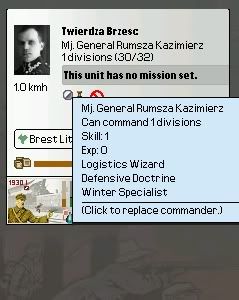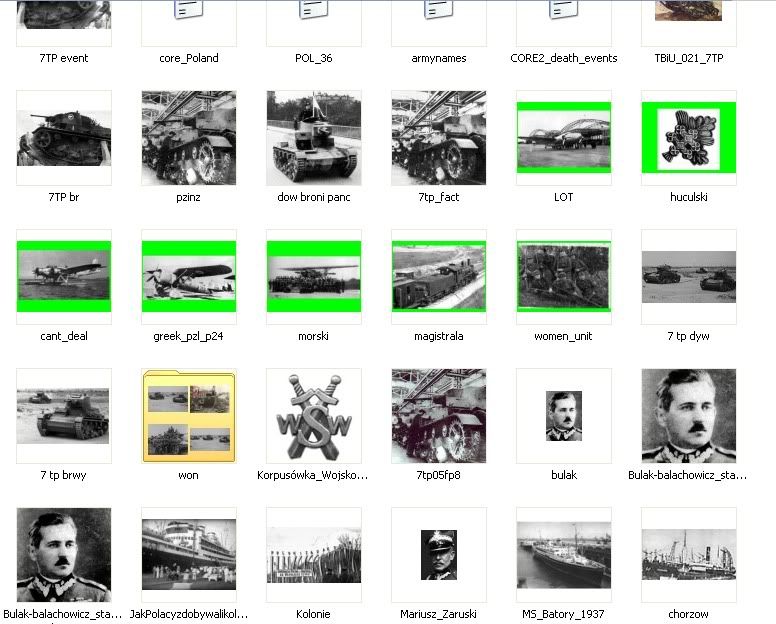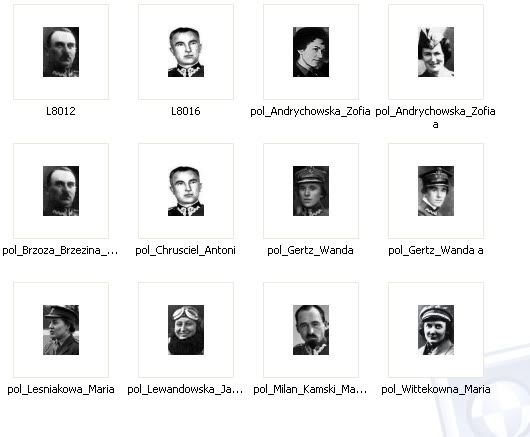Here it goes
http://rapidshare.com/files/402899927/superpatch.rar.html
You might consider restarting your campaign, but only if you want to use new commanders.
Most of the graphics will show up anyway because pictures appear here in two copies - one for vanilla list and one with new names I am using with new lists so
you won't lose too much.
For POL there is one significant presence -
A long lecture will follow so you might stop reading right now.

I tend to be careful with traits, except trickster in some cases at least, but this guy definetely deserves all three.
As you might now there is a relatively large Polish community in Siberia. Mainly descendants of political prisoners from the XIXth century, especially after failed uprisings in 1830-31 and 1863-64 fought in so called 'congress Poland', Belorus, Lithuania and Ukraine. Less known fact is that Siberia was also the destination a clever bussinessman would often choose in late XIXth and early XXth century Russia. At that time it was something comparable to American Wild West mixed with rapid industrialization fuelled by mostly foreign credits (especially from France) so basically a land of opportunity.
Industrialization created a great demand for well educated engineers and at that time 'thankfully' technical education was the only one you could receive in 'Russian Poland'. Universities were closed down and literature was struggling with unprecedented annoying and small minded censorship e.g. censors removed things such as references to kings of Poland because it could suggest they were equal to tzars so people with ambition tended to finish their education abroad (e.g. one certain Maria Skłodowska later known as Curie) or outside of the congress Poland in Russia proper, Estonia, Latvia or Ukraine or as the last option were choosing seemingly non-political directions such as medicine or the mentioned engineering.
In a way you could say that the most ambitious were 'emigrating' inside the Russian empire or sometimes to various corners of the world, while the least skilled (and often half-illiterate) were choosing places such as new factories of Łódź, Upper Silesia, the Rheinland or the United States.
This drive coincided with the fallout of the January Uprising resulting in positivism* - organic work and similar drives to rise Poland through education, industrialization and in general getting rich in a responsible way. As usual and as before (1815-30) it was doomed to fail because corrupted administration, irrational pan-slavism and forced russyfication made 'Russian Poland' difficult territory to implement such ideas in practice - the inevitable failure reflected by rise of nationalism and socialist movements, but it still means considerable achievements were made. Still it was easier in Russian 'mainland' especially in Siberia where the authorities were more keen on attracting people than extort money.
Political prisoners tend to be better educated in general so there is a greater chance they will use some opportunities granted by bussiness environment of Siberia which unlike harsh weather was quite friendly. If you look closer there will be dozens of names of Poles who spearheaded exploration of this region of Russia often helping each other so a form of local Polish lobby** was formed.
Unlike in Southern America (Domeyko), Australia (Strzelecki) it was not about single characters leaving their mark, but about entire dozens of men just like one certain man named Piłsudski, Bronisław Piłsudski - brother of the Oldman himself - well known in the far corners of Russian and northern Japan.
I wrote it to explain what sort of people formed local Polish community. There were no less than 0,5 million Poles living in Siberia, Azarbaijan or other areas where Russian was quickly developing and when the revolutions came many of them attempted to leave the chaos of the civil war behind them***, often forming armed formations just like
5th Polish Rifle Division.
Unlike the famous Czechoslovak Legion divisions such as this were often centers of civilisation or at least relative stability. 5th Division was as much as little Poland with its own schools (learning uncensored Polish history was especially important), theaters and libraries. Comparable to the 2nd Polish Corps during the II WW.
Kazimierz Rumsza was a commander of the division which later fought in Siberian conditions against the Bolshevics covering retreat of civilians and their Czech and White Russian allies.
Because of a deal made between the Reds and the Czechs the division was in the end left stranded which most likely some of those soldiers never forgiven and had to capitulate. Only remnants led by colonel Rumsza reached safety of Manchuria and with Japanese help manage to evacuate to Poland where they formed first Siberian Brigade and later the core of the 30th Infantry Division.
I made him as skill 0 (lower than on the image), logistical wizard, defensive specialist and winter fighting expert.
* Bolesław Prus described it very well in novel
'Lalka'.
** as excellently presented by Jacek Dukaj in his sf super-novel
'Lód' ('Ice').
*** Stefan Żeromski dealt with this subject admirably in
'Przedwiośnie'.
Yep, I enjoyed all those three readings.
Jacek Dukaj is my most favourite writer of young generation - not for no reason often compared to Stanisław Lem. When
Tomasz Bagiński finally manages to create a movie based on 'Ruch Generała'
Iron General or 'Inne pieśni'
'Other Songs' it will blow your mind.

'Lód' is sadly too massive and my favourite 'Xavras Wyżryn' too dark.






